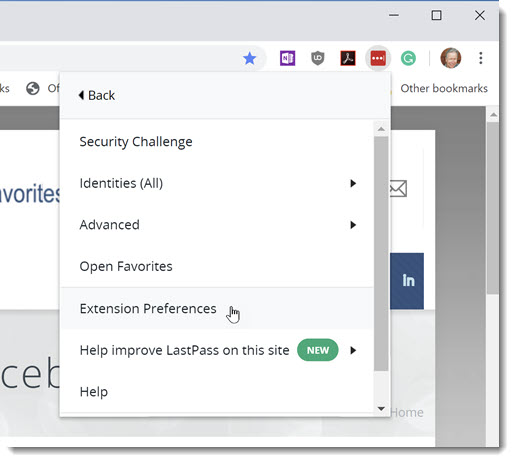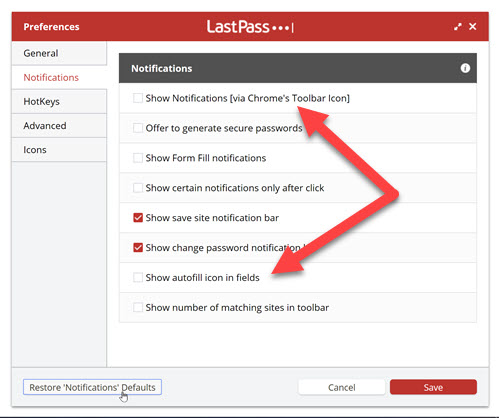
LastPass is slow. It’s hard to overlook.
If you’re using LastPass, I want you to keep using it! You need a secure way to keep track of passwords and confidential information. For most people, the “best” program is the one that you already use. I don’t want anyone to read this and get excited and then have something go wrong and lose your passwords and suffer embarrassing hacks and have your identity stolen and wind up homeless and alone. Wouldn’t you rather use LastPass, even if it’s a little slow, rather than have that happen to you? Of course you would.
Okay, now keep that in mind while I complain.
I’ve been using LastPass, and recommending it to everyone, for more than ten years. For the first time, I’m worried about it. Not about its security – the design makes it effectively impenetrable. But about its performance, and about the future of the company.
The Chrome extension for LastPass is slow. It’s slow to load. It’s slow to respond the first time you click on it. It’s slow to fill in fields on websites. There’s a delay of one to several seconds for just about everything I ask it to do.
The first click on the extension icon is especially problematic: when I open Chrome the first time and browse to a website that needs a password and click on LastPass, I might be waiting 10-15 seconds before the dropdown menu appears. I have a monster computer on my desk – fast processor, 32Gb of RAM, SSDs. I can restart Windows in 10-15 seconds. There’s no excuse for LastPass to respond that slowly. It’s just badly written.
I don’t think I’m alone. There are scattered complaints about slowdowns caused by the LastPass extension in Chrome, Firefox, and Edge. I’ve studied Chrome’s Task Manager (click Shift-Esc in Chrome – it’s separate from the Windows Task Manager and darned interesting if you like that sort of thing). The LastPass extension uses CPU cycles when you click or do a search or use it to fill a form, but the CPU and memory usage don’t seem excessive.
But it’s slow.
There is some uncertainty about the future of LastPass. LogMeIn bought LastPass in 2015, then left it mostly alone, other than some unwelcome price increases. LastPass got a major update in March 2019; after nearly a year, I still don’t like the UI changes, and I think that’s when performance took a nosedive.
Now LogMeIn is being acquired by private equity companies, in a deal expected to close this summer. So far, nothing has changed, and perhaps the new owners will be good stewards and only make LastPass better. But the acquiring companies reportedly have a record of, yes, milking existing customers to get a quick revenue boost, then spinning off profitable divisions. I’m old and cynical and I fear the worst.
What can you do to speed up LastPass?
I don’t know if this really makes any difference. Maybe I believe in it because I want it to work. Test it and let me know.
There are two checkboxes in the LastPass settings that I unchecked. It feels like LastPass is faster.
Click on the LastPass icon in the upper corner of Chrome, then click on Extension Preferences.

Click on Notifications on the left.

The first box I unchecked is Show Notifications (via Chrome’s Toolbar icon). If I understand correctly, when that box is checked, LastPass checks the Vault every time you load a new web page and displays the number of matching entries on the icon in the upper right.
The second box I unchecked is Show autofill icon in fields. Again, as I understand it, when that box is checked, LastPass looks at the entire page for login and password fields, then overlays an icon at the right of each field. You can click on the overlay icon for a dropdown menu of LastPass options.
My guess is that both of those features require LastPass to do work every time you load a new web page. They’re not all that useful. In particular, the icon in the login fields is often nonfunctional or overwritten by something from the website.
I can’t tell you for sure that it made a difference to turn those off, but it made me feel better, and I sorta kinda think that Chrome and LastPass are more responsive now.
What can you do to replace LastPass?
If you’re fed up with LastPass for whatever reason, try BitWarden. BitWarden’s interface is similar to LastPass, but with less bling and maybe the better for it. It uses the same model for security. BitWarden can be installed on multiple devices and keep all of them up to date by syncing an encrypted blob. You can unlock the vault with a master password, but BitWarden has zero access to your data. A hacker would get nothing of yours from an attack on LastPass or BitWarden.
BitWarden is a small company, but it passed a third-party security audit. Its software is open source. They’re the current darling of the tech community. If you’re switching from LastPass, it’s possible to export your LastPass Vault and import it into BitWarden with only a modest amount of cleanup afterward.
There are many other reliable password managers out there. You might find features in 1Password or Dashlane that make you happy. I don’t have enough personal experience to push one in particular. Choose one and go forth and prosper.
The important thing is to use some system for password management. Use complex passwords. Always use different passwords for every service. Be careful out there!

We have been using Lastpass for a few months now, we too have been finding lag, we have a lot of passwords in the group around 1500, its slow just to load the website up and start searching, more than 20 seconds, I like last pass but guys get rid of you java engine it s slow and needs fixing, searching on my phone is quicker, love the app great do that for the PC’s please!
My browser was extremly slow. i have fixed it by clearing the local cache.
see https://support.logmeininc.com/lastpass/help/how-do-i-clear-the-local-cache-for-my-vault-lp010126
The performance hit Lastpass gives is ridiculous. Running a DOM test (google “browserbench spedometer”, i dont want appear spammy) gives the following results on my hachine (core i9, 32GB ram, NVMe SSD)
Lastpass gives a performance hit of about 30-50%
uBlock gives a performance hit of about 10%
Scores, higher is better:
All my plugins on: 55
All my plugins off: 105
Only uBlock on: 93
Only uBlock + Lastpass on: 60
Only uBlock + Lastpass with your settings disabled: 60
Rerunning the test with some changes (clean cahche, other tabs open etc) gives a variance of +- 5 on all test numbers.
Note that this test might be biased since it selects an input field wich i would not consider to be a part of “regular browsing” – but rather an occasional activity (search, login). This might give Lastpass a disadvantage compared to other plugins, but not compared to other plugin-managers.
Interesting! I’ve been testing 1Password (informally, I don’t have the expertise to do real benchmarks) and it’s been night and day for my perception of how quickly it responds. Always wrenching to switch from one program to another, with a lot of muscle memory to retrain, but now that I’m comfortable with 1Password, it seems like a big improvement.
Bruce,
You’re completely right. I recently noticed the same issues. I was testing various browser performance on my Macbook pro. (Brave, Safari, Chrome, Firefox, Edge, & BraveDev)
Like you I’ve recommended lastpass to others in the past. I’m not regretting that.
All of them showed a significant performance impact with lastpass enabled. In some cases (safari and brave) it was a 50% hit. In my initial testing I noticed that the faster the browser, the larger the impact. Which would make sense if the delay is a fixed amount of time spent on Lastpass JS and calls to the mothership.
I’ve began testing 1password and see a small reasonable hit. Maybe about 5-10% depending on the browser. Not to mention the UI feels like a finished professional product worth a yearly subscription fee. I’ve only been using 1password for a few days, but have noticed that all the heavy lifting is done via a binary daemon running in its own threads. The individual browser extensions make local calls to this daemon. This seems much more effective.
I’m planning on doing some additional testing and posting the results. I’ll most likely testing both MacOS and Window 10 and post the results.
I’m interested in learning what you think. I’m heavily invested in LastPass, but this daily little pain point still irks me.
Hello Bruce,
i use LastPass on Core 5 processor, Sony Vaio, not nearly as beefy as your machine. it is fast with no noticeable delay, and with the boxes checked that you suggest unchecking. on the current version of Firefox.
Could it be Chrome is the issue. doesn’t sound likely but who knows.
i was interested by the recent private equity sales. you are right, that will most likely involve a fee increase. i may very well take your advice and switch to Bitwarden.